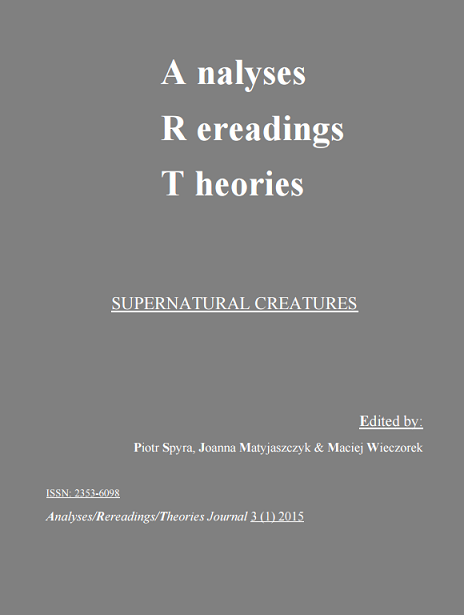The Ambiguous Identity of a Dog as a Mongrelized Storyteller in John Berger's King (1999)
DOI:
https://doi.org/10.18778/2353-6098.3.01Keywords:
John Berger, point of view, dog as narrator, genre conventions, English dog idioms, post-fantastic characterisation, magic realism, ambiguity of characterAbstract
The dog named King, the central character and narrator of John Berger’s “King” published in 1999, is the offshoot of many apparently incongruent genre conventions as well as the offspring of the ambivalent prejudice and praise of the species encoded in the English idioms. This presentation aims to overview the contributing elements which gave rise to the Bergerian shift in character-narrator shaping and to discuss the function of such perspective for the novelistic format adopted. The discussion points out the central role of the ambiguity of King as a dog, demonstrating the post-fantastic nature of his characterisation rooted in the conventions of magic realism. The patterns used to shape King, the dog, as one of the community and at the same time the Other are discussed. He is a befriended dog who becomes almost a family member for the beggars and, at the same time, he is the other, different species. He is both one of the homeless and at the same time the independent one, the stranger who sees more because of the distance inscribed into his nature of a rambling dog. Such is also the function of the fantastic in his shaping, as it is sometimes not quite clear that he is just a talking dog, derived from the tradition of animal fable. He might as well be taken as a mentally challenged human being who lost his identity. The merging of perspectives on all levels of the novel contributes to the dialogic quality of the narration in the Bakhtinian sense, to which the central ambiguities inscribed in the shaping of the quasifantastic dog add the quality of uncertainty and polyvalence.
References
“Animals.” Dictionary of the Celts. New Lanark: Geddes and Grosset, 1999. 7-8. Print.
Google Scholar
Bakhtin, Mikhail. “Discourse Typology in Prose.” Readings in Russian Poetics: Formalist and Structuralist Views. Eds. Ladislav Matejka and Krystyna Pomorska. Trans. Richard Balthazar and I. R. Titunik. Cambridge, MA: MIT Press, 1971. 176-96. Print.
Google Scholar
Bakhtin, Mikhail. The Dialogic Imagination: Four Essays. Ed. Michael Holquist. Trans. Caryl Emerson and Michael Holquist. Austin: U of Texas P, 1981. Print.
Google Scholar
Berger, John. King: A Street Story. 1999. London: Bloomsbury Publishing, 2000. Print.
Google Scholar
Bernaerts, Lars, Marco Caracciolo, Luc Herman and Bart Vervaeck. “The Storied Lives of Non- Human Narrators.” Narrative 22.1 (2014): 68-93. Print.
Google Scholar
DOI: https://doi.org/10.1353/nar.2014.0002
Chesterton, G. K. Introduction. Aesop’s Fables. Ware, Hertfordshire: Wordsworth, 1995. 15-19. Print.
Google Scholar
“Epic.” A Dictionary of Literary Terms. Ed. J. A. Cuddon. London: Penguin, 1982. 225-34. Print.
Google Scholar
“Hunter-god.” Dictionary of the Celts. New Lanark: Geddes and Grosset, 1999. 113. Print.
Google Scholar
Kokot, Joanna. Takie sobie bajeczki. Gry z czytelnikiem w nowelistyce R. Kiplinga. Gdańsk: Wydawnictwo Gdańskie, 1993. Print.
Google Scholar
Messmer, Michael W. “Apostle to the Techno/Peasants: Word and Image in the Work of John Berger.” Image and Ideology in Modern/Postmodern Discourse. Ed. David B. Downing and Susan Bazargan. Albany: State University of New York P, 1991. 199-230. Print.
Google Scholar
Munro, H. H. “Tobermory.” The Complete Short Stories: Saki. 1976. London: Penguin, 2000. 108-15. Print.
Google Scholar
Papastergiadis, Nikos. “John Berger: An Interview.” The American Poetry Review 22.4 (1993): 9-12. Print.
Google Scholar
Rodríguez-Díaz, Douglas B. “Microcosm as Metaphor: Naturalism in Europe and Latin America.” Neophilologus 75.3 (1991): 379-89. Print.
Google Scholar
DOI: https://doi.org/10.1007/BF00406703
“Shape-changing.” Dictionary of the Celts. New Lanark: Geddes and Grosset, 1999. 205-06. Print.
Google Scholar
Simmons, Rochelle. “John Berger.” Abbey Theatre – Caryl Churchill. The Oxford Encyclopedia of British Literature 1. Ed. David Scott Kastan. Oxford: Oxford UP, 2006. 178-80. Print.
Google Scholar
The Bible: Authorized King James Version. Ed. Robert Carroll and Stephen Prickett. Oxford and New York: Oxford UP, 1997. Print.
Google Scholar
Downloads
Published
How to Cite
Issue
Section
License

This work is licensed under a Creative Commons Attribution-NonCommercial-NoDerivatives 3.0 Unported License.









